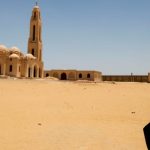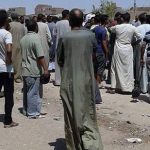TIMEP Brief –
- Reporters Without Borders ranked Egypt 161st out of 180 countries for press freedom in 2017, citing campaigns by security forces to marginalize dissenting media opinions and the passage of a law that created a monitoring body with the power to fine or suspend media outlets.
- Tactics including imprisonment of individual journalists, media blackouts, channel closures or blockages, and laws criminalizing “false news” have been used to stifle both independent and, increasingly, even pro-regime media.
Overall Situation:
Egypt today is among the world’s worst offenders against press freedom. While Egypt’s current constitution enshrines a free press, bans censorship, and ensures press independence, these rights are not protected in practice. The government has frequently imprisoned journalists or blocked them from reporting; with 20 journalists in jail, Egypt was ranked as the third-worst jailer of journalists worldwide in 2017 by the Committee to Protect Journalists. The government has additionally targeted critical or independent news outlets for closure; the country was ranked 161 of 180 countries surveyed for press freedom by Reporters Without Borders’ 2017 report, which was released a few weeks after al-Bawaba, a daily publication, had two days of print runs confiscated for being critical of the security services. In late 2017, the independent media outlet Mada Masr reported on the General Intelligence Agency’s acquisition of a media conglomerate that owned OnTV, al-Youm al-Sabaa, and five other media outlets.
This situation has only deteriorated in 2018, with reporting on the controlled nature of the election period or coverage not absolutely favorable to President Abdel-Fattah El Sisi facing hostility. At least 12 media workers were arrested or imprisoned in the first four months of 2018, court proceedings threaten to close the BBC’s Cairo office, journalist Bel Trew of the Times of London was expelled, the number of blocked websites by government authorities has exceeded 500, and the outlets Masr al-Arabia and al-Masry al-Youm were ordered to pay hefty fines.
Background:
Under former president Hosni Mubarak, journalists were pressured out of work, attacked by security forces, detained for their reporting, and arrested for covering sensitive issues or government decisions. Despite a temporary opening of media space in 2011, the Egyptian state’s violations of press freedom following the January 25 Revolution include outlet closures as well as the deaths, arrests, and sentencingof Egyptian and foreign journalists, particularly after the Raba’a al-Adaweya Square dispersal in August 2013. Photojournalist Mahmoud Abu Zeid, known as Shawkan, was detained while covering the events at Raba’a, and spent over two years in pretrial detention (in violation of legal limits) before being formally charged. Shawkan, who was given the International Press Freedom Award by the Committee to Protect Journalists in 2016, remains in prison, suffering from deteriorating health and denied medical treatment. The case of three Al Jazeera journalists—Peter Greste, Mohamed Fahmy, and Baher Mohamed—arrested in December 2013, also grabbed international headlines when the men were originally found guilty of spreading false news and aiding the Muslim Brotherhood and sentenced to between seven and 10 years in prison. Following an international outcry, Australian Greste was deported; Fahmy and Mohamed were pardoned by Sisi in September 2015.
Security forces have also targeted journalists for organizing as part of the Journalists Syndicate, as was the case with journalists Mahmoud al-Sakka and Amr Badr, who were arrested in May 2016 from the union’s headquarters during a demonstration protesting the cession of the Tiran and Sanafir Islands. Syndicate head Yehia Qallash and two board members were later sentenced to two years in prison for “harboring fugitives” in a related case (though the decisions were suspended). Since then, the syndicate has at times still supported journalists under pressure, such as when the institution affirmedits solidarity for the reporters from al-Masry al-Youm and Masr al-Arabia.
The government has also moved to ban privately owned and international news outlets, including Al Jazeera and the BBC, for coverage it views as biased or inciting violence. Egypt’s State Council administrative court similarly ordered the closure of four television channels in 2013—Al Jazeera Mubasher Misr, Ahrar 25, al-Quds, and al-Yarmuk—pegged as sympathizers with the now-banned Muslim Brotherhood. In January 2015, Sisi issued a decree giving the prime minister the power to ban any foreign publication “offensive to religion.” Following a BBC report documenting human rights abuses under Sisi, government officials motioned to suspend the media outlet’s operating license for disseminating false news (a suit is pending to censor the network). The government has also extended its censorship policies to include reasons of “morality,” as when the Supreme Council for Media Regulation banned four different entertainment programs in February 2018, including SNL Arabia.
Censorship of existing media is a common occurrence. Nearly 500 websites are currently blocked in Egypt, which security agencies justify by claiming that these institutions support terrorism and spread lies pertaining to the government. The most recent site blockage, al-Manassa, occurred after the outlet published a report on a U.S. delegation that visited polling locations during the presidential election, which security authorities referred to as information in support of terrorism. Media gag ordersare similarly used to prevent reporting on sensitive issues, and the 2015 Counter-terrorism Law forbidsjournalists from publishing information that contradicts official government accounts of security data. Self-censorship is also common, and as early as 2014 a group of Egyptian newspaper editors signed a statement pledging to limit criticism of state institutions.
The presidential election period witnessed an intense crackdown on the media. Six reporters were arrested in the week following the voting period for reporting on a New York Times article detailing vote buying. While the specific charges for each journalist varied, a common component was the charge of “spreading false news in an attempt to defame the state.” Similarly, al-Masry al-Youm newspaper and Masr al-Arabia were fined LE150,000 and LE50,000 respectively for publishing reports pertaining to the New York Times article, in addition to investigations of the editors-in-chief at both publications. Prior to the election, authorities arrested, threatened with military trial, and ultimately expelled the Times of London reporter Bel Trew for reportedly not possessing the proper credentials as a foreign correspondent. The crackdown during this period reached supporters of the government, as pro-state TV host Khairy Ramadan was detained for what he described as the grand sacrifices of police forces in comparison to their low salaries.
Government officials and politicians in Egypt have rejected accusations that the state is targeting press freedom, while failing to protect that same freedom. Sisi has often refused to pardon journalists, arguing that his government “will not interfere in judicial rulings,” and instead should “respect judicial rulings and not criticize them.” In August 2015, Sisi stated that no journalists in Egypt are being jailed for crimes related to publishing after a meeting with editors of various African newspapers. Egypt’s foreign minister declared in August 2015, that no journalists are in jail in Egypt for doing their job; he claimed that all detained journalists have been implicated for terrorist activities or have broken the law.
Analysis and Areas of Concern:
While suppression of press freedoms was common under Mubarak, it has become systemic under Sisi, especially as he attempts to strengthen his control of public forums after securing a second term. Arrests of individual journalists, targeting of independent news outlets, censorship, and the passage of increasingly restrictive legislation are all designed to suppress independent news voices and criticism of state policies. Assurances by Egyptian officials that there is no targeting of independent media ring hollow when the country ranks third internationally for the number of jailed journalists. Independent media outlets have been increasingly brought under state control, whether through the aforementioned coercive tactics, the military intelligence’s acquisition of a large media conglomerate, or through the creation of a climate of fear in which journalists are forced to choose between self-censorship or sanction.
__________________
https://timep.org/reports-briefings/timep-briefs/timep-brief-press-freedom-in-egypt/
Photo: Protest outside the Egyptian Syndicate of Journalists (Face-Masr)





